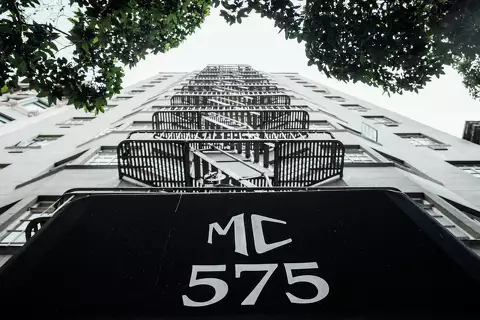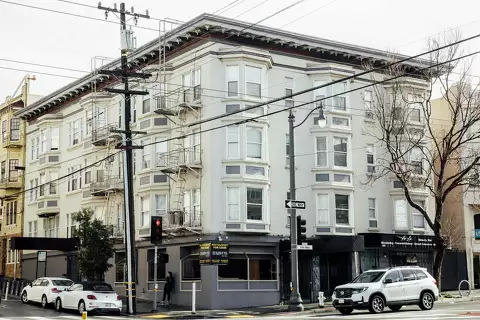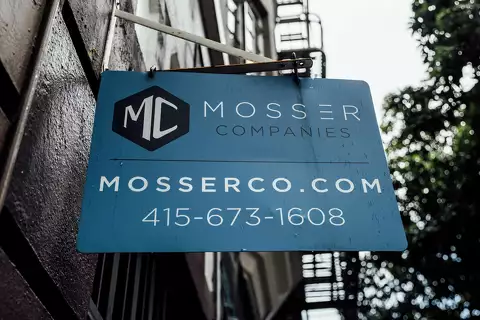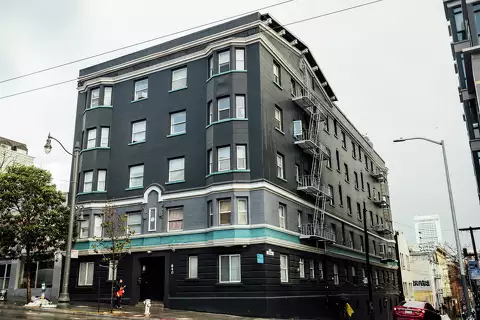By Laura Waxmann Feb 2, 2024
https://www.sfchronicle.com/realestate/article/rental-property-san-francisco-18639824.php

Mosser Companies, which owns several San Francisco properties, including 575 O’Farrell, is selling a sizable chunk of its city portfolio. Stephen Lam/The Chronicle
Much has been made about the distress plaguing San Francisco’s downtown in the wake of the pandemic — with increasing office vacancy rates, retail decline shuttering stores and prominent hotels defaulting on loans. The fallout from remote work and maturing debt has caused a number of office owners to hand the keys to buildings back to lenders, or sell once highly valuable properties at bargain prices.
It’s also taken a toll on multifamily home properties, the large-scale apartment buildings and condo complexes that also fill the city’s downtown grid. In recent months, great swaths of rental properties have changed hands as owners are seeing their real-estate empires shrink significantly for the first time in decades — thanks to high interest rates and a drop in occupancy and rental income fueled by the same pandemic factors.
The latest movement in these multifamily home properties comes from Mosser Companies, which in August defaulted on a 2018 loan for $88 million that was backed by 459 rental units across 12 buildings it owns and operates in San Francisco. The company’s lender is now actively working to sell the nonperforming loan, and has hired real estate firm Cushman & Wakefield to market the portfolio.
Some 85% of the units that are tied to Mosser’s defaulted loan are located in San Francisco’s Civic Center neighborhood; the rest are in other parts of downtown and SoMa. A sales brochure for the properties provides insight into the conundrum: When the loan originated in 2018, the portfolio was 94% occupied and appraised for $154 million — a value that was expected to increase over the term of the loan. The opposite happened.

Mosser Companies, which owns 2360 Van Ness in San Francisco, has defaulted on an $88 million loan and will be selling a portion of its holdings in the city. Stephen Lam/The Chronicle
It’s becoming a familiar story for multifamily landlords who had been riding the wave of strong demand for rental housing coupled with steady rent growth since the 2008 housing collapse — and benefited from “cheap debt” that was available in its wake. But they haven’t been immune to the current conditions, even though the sector has historically been viewed as a relatively safe bet for investors.
“San Francisco has gone through a wave of distress in real estate because of the economic upheaval resulting from the COVID years. And while the market reset is in play, an enormous amount of real estate debt is coming due, creating a push to refinance loans that were originated pre-pandemic,” a Mosser spokesperson said. “This also comes at a time when both general vacancies and interest rates are historically high.”
The Mortgage Bankers Association estimates that $2.6 trillion of real estate loans are coming due nationally through 2028. The multifamily sector accounts for 38% of those loans.
San Francisco will carry a share of that total. According to data provided by Costar, more than $1 billion in commercial mortgage-backed securities loans — which refers to commercial loans that are sliced into bonds and sold to investors — tied to the multifamily sector in San Francisco are coming due between 2024 and 2028.
Nigel Hughes, senior director of market analytics for Costar, warned that the maturing CMBS loans represent a sliver of the debt that’s coming due in San Francisco. CMBS loans account for just 3% of all multifamily loans, with the majority being held by either the regional banks or by government sponsored enterprises like Fannie Mae and Freddie Mac, he said.
Mosser Companies will be selling 12 buildings, including 840 Van Ness, across its San Francisco portfolio. Stephen Lam/The Chronicle
The Mosser sale comes after Veritas Investments, which not long ago was San Francisco’s largest multifamily landlord, parted with roughly one-third of the more than 2,400 rental units that it has long operated in the city.
Last year, Veritas defaulted on $1 billion in loans tied to dozens of its buildings. The loans have since been sold to two different owners — San Francisco’s Prado Group and a partnership between Brookfield Properties and Ballast Investments — which separately foreclosed on the properties and now own them.
Owners who took on short-term or floating-rate debt — which has a variable interest rate, rather than a “fixed” rate — in recent years are in imminent trouble, according to John Drachman, who is the co-founder and head of capital markets for the Southern California-based Waterford Property Company.
“Unfortunately for them, the interest rates on those rose dramatically, as interest rates rose across the board, and they’re unable to service those loans now,” Drachman said. “What you’re seeing is that rising interest rates, as well as rising operating expenses, combined with lower occupancy and lower rents, are having a meaningful impact on the multifamily market in San Francisco and many other markets around the country.”

Mosser Companies’ decision to sell a chunk of its San Francisco portfolio, related to a defaulted loan, is another indicator of the troubles facing the city’s rental market. Stephen Lam/The Chronicle
Whereas multifamily operators in other cities are also feeling the pressure of maturing debt, the issue is more often connected to the “amount of new supply that’s getting added to those markets and the impacts on rent,” Drachman said, adding that, in San Francisco, “it has nothing to do with new supply.”
“It’s more about the outmigration of people, increasing operating expenses, all the eviction moratoriums and rent increase moratoriums — it’s just wreaking havoc on certain multifamily projects, especially when people took on short-term or floating-rate debt,” Drachman said.
As of January, total occupancy for Mosser’s properties had dropped to 82%, and the $88 million loan is being marketed for sale to the highest bidder.
“This is the reason why multifamily in San Francisco is suffering so badly and you have these portfolios that have gone up for sale: multifamily was hit with a triple killer, which is increased interest rates, lower occupancy rates and declining rents,” said Nathaniel Touboul, a real estate partner at law firm Allen Matkins.
In valuing multifamily properties, investors and lenders analyze current occupancy rates and future rent growth, he said.
“In San Francisco, in 2018 and 2019, business was booming, people were paying top dollar for apartments, and vacancy rates were extremely low. No one at that time was underwriting vacancy rates and declining rents such as the ones we have experienced post-pandemic, Touboul said.
Touboul said that the present situation in San Francisco, in some ways, represents a “changing of the guard,” in which new groups are buying into the market at significant discounts.
“What is happening right now is really an illustration of and a reminder that, ultimately, San Francisco is a boom and bust city, and real estate is cyclical in nature,” Touboul said.
“In this case, San Francisco’s real estate market was frothy pre-pandemic and got hit particularly hard by a COVID and work-from-home exodus, which it is still recovering from,” he said.
For tenants, the impacts are less clear. Rents could theoretically dip when a new owner takes over a property at a lower basis and seeks to lease it up, said Drachman, of Waterford. New owners might also be better positioned to make improvements to the properties.
But generally, the tenant experience will be “somewhat business as usual.”
“Usually there’ll be anywhere from a three- to nine-month transition period that can feel pretty rough to tenants — they can call the management company and there’s no one picking up the phone,” he said. “So a transition can be difficult for existing tenants.”
For owners, losing a real estate portfolio means changing course, but it does not necessarily signify the end of the road.
“As we’ve recently seen from other portfolios trading ownership and management, there will be an ongoing reshuffle of properties in the city due to the overwhelming macro environment, and Mosser intends to participate for the benefit of new investors,” said Mosser’s spokesperson. “We are ingrained in the community and real estate market and despite the current market upheaval, we strongly believe in the long-term merits of San Francisco and continue to partner in opportunities to provide quality housing.”
Reach Laura Waxmann: laura.waxmann@sfchronicle.com




Another top S.F. landlord parts with housing portfolio. Why the city’s rental market is in dire trouble.
Hi Laura,
Thank you for your article, I just read it.
I think there were three gross omissions in your article, that merit noting and correction, a follow-on article:
1. The total mismanagement of the city of San Francisco – the Mayor and elected officials failed to manage this once great city where my family hailed from. Bad policies, “progressive” ideas, and the lack of law and order is to blame for the real estate situation today.
2. Together with the above, the homeless situation was also not mentioned. The corrosive effects and impacts from the homeless, drug addicted, criminal behavior, and vagrancy has taken a tremendous toll on property owners and tenants. Few want to live with this situation, much less own or operate properties with this around them.
3. The retail/entertainment environment- once a great shopping and dining experience, San Francisco has been hit hard by the lack of law and order, impacts from (left leaning and backed) Prop 47 (no penalty for crimes), and the homeless situation. Whole Foods, Nordstroms, Walgreens, and even See’s Chocolates (and other long time retailers) said NO to San Francisco, packed up and left. What’s left?
It’s critical that journalists cover all the issues. Thank you for reading and correcting the record.
Elena Thompson, “E.T.”, Realtor